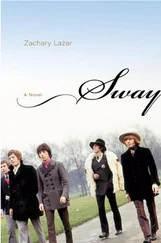
Creek bed, Valley of Elah
He was squinting a little in the sunlight — it struck me as notable somehow that he wasn’t wearing sunglasses. He walked with his hands held near his chest, slowly massaging the knuckles of one hand with the fingertips of the other, elegant in his dark suit. I pictured the truck driving Bellen into Bethlehem, the man at the wheel not a terrorist or a fanatic but a strange kind of accomplice. Voss had gone silent and now he watched his feet on the uneven ground, then looked up as if to survey the landscape with fresh eyes. “I never knew this place was actually here,” he said, amused. We were almost all the way down the hillside. Between the rocks jutted thorny weeds with flowers like yellow explosions. The creek bed was choked with dead grass and thistle almost chest high. There was a culvert made of concrete and steel. Voss kicked aside some litter, a potato chip bag, then picked up a stone. You couldn’t go into that dry creek bed and not pick up a stone.
“If you want to go to Tel Aviv, I’ll explain more,” he said.
“I thought you were the one who cared only about the facts.”
“That’s not the kind of piece you’re interested in.”
“How do you know?”
He gestured at the empty landscape and let the stone fall. “Look where we are. Not exactly an essential stop.”
10) JET LAG
Around eight o’clock that night, we woke up in my hotel room — or rather, I woke up — Voss was already sitting in the chair by the window, reading. Still jet-lagged, feeling drugged by it, I could have slept much longer. I had dreamed of violent attacks on villages in the desert, men on camels setting tents on fire, hacking at people with machetes. The shades were drawn, and in the faint ring of yellow light from a single lamp, Voss looked like some otherworldly functionary scanning the newspaper in his suit and large black shoes. We’d had a drink in the bar — a club soda for Voss, who doesn’t drink liquor — and I said that I needed a shower, and he’d simply nodded, holding his ground. I’d seen this coming since that moment I’d slipped on the path at Tel Azeka and he’d caught my arm. He reached his hand out now to pay for the drinks and I stopped him, putting my hand on top of his. His hair had been tousled outside and it gave him a preoccupied, middle-aged look, especially with his suit, which was still remarkably clean. In the elevator upstairs we didn’t look at each other, much less touch, nor did we talk. It was as we stepped into the room that he reached for me. I was wet before he reached for me. He shut the door and we kissed, Voss pulling my face to his. Either you’ll trust me for telling you even this, or you’ll distrust me for telling you even this. It had something to do with the way he carried himself, his wariness. He seemed to be always signaling that he was a corrupt person, that he had degraded himself. He knew this was attractive but that didn’t mean it was an act. There are men who think about their own body in addition to yours. Voss wasn’t one of them. He came at me thinking about only one thing.
“You’re still here,” I said now. “I thought you would have left.”
He didn’t answer.
“I’ll put this moment in the piece too,” I said.
“Why?”
“Because it happened. Because it sheds light on everything else.”
The room was a tranquilizing blend of contemporary patterns and Levantine colors — black and red and gold. I had a Hebrew name, Voss said — why had I never been to Israel? It was a long story, I answered. He asked if I had been to Yad Vashem, the Holocaust memorial, and I told him no, I had no real interest in it. He said I should see it. We made plans to go see it together after we finished the story.
11) BATHSHEBA
Ivan Schwebel paints the episode many different ways, but my favorite paintings are not of Bathsheba but of her wronged husband, Uriah. Almost the first thing David does as king in his new capital, Jerusalem, is to betray one of the very men who had helped him in his rise: he sees the naked Bathsheba and he sends his men for her. Jerusalem and all it might mean — shelter, peace, a unified state, his own glory or God’s — is something he seems compelled to throw away. Uriah “lay at the entrance to the king’s house with all the servants of his master,” loyally guarding the palace. Inside, David is sleeping with Bathsheba. She becomes pregnant. When that happens, David has to try very hard to get Uriah to sleep with her too, to hide his own paternity, but Uriah refuses to leave his post. “The Ark and Israel and Judah are sitting in huts,” he says, “and my master Joab and my master’s servants are encamped in the open field, and shall I then come to my house to eat and drink and to lie with my wife? By your life, by your very life, I will not do this thing.”
David gets him drunk. In one of Schwebel’s renderings, Uriah is a smiling young IDF private dressed in green fatigues and cap, still unshaven from the battlefront. He’s seated at a table before a glass of wine, and the David who coaxes him toward drunkenness, hand on Uriah’s shoulder, is a gray-haired man in the open-necked sport shirt and white slacks of a corrupt city councilman or an aging mobster. Even drunk, Uriah refuses to leave his post. The solution David comes up with is to write a letter to his commanding general, Joab: “Put Uriah in the face of the fiercest battling and draw back, so that he will be struck down and die.” Uriah is killed by the Philistines. This is to say that he dies from multiple contusions, bludgeoned or stabbed, perhaps trampled on the ground by horses. The IDF has never released photographs of David Bellen’s mutilated corpse. They identified it by the cards in his wallet. Bald and stocky, Bellen lamented, caustically, the frequently unbridgeable distance between himself and the beautiful young women he would see on the beach in Tel Aviv. He wrote that they liked “gold rope, barbed wire tattoo / the high sheen of / the Kid with his shirt off.” In his poems, Bellen never condemns David, even for ordering the murder of Uriah. If anything, Bellen seems to admire David for his ruthless vitality. It’s not hard to see how this very admiration, expressed without piety or reverence, might have gotten Bellen killed.
12) THE SON
I went with Voss to visit Bellen’s son, Eliav, in his shop in the mountain town of Tsfat, near the Golan Heights and the border with Lebanon. Tsfat, an odd mix of Hasidim and New Age hippies, has been a center of Jewish mysticism since the fifteenth century, a place where revered kabbalists founded small synagogues that are still there today. Eliav’s shop, like many in the town, deals in Jewish-themed art in a kitsch style loosely derived from Chagall. On either side of the entrance hung multicolored amulets called hamsas in the shape of disembodied hands meant to ward off the evil eye. As Bellen’s only child, Eliav had come into possession of his father’s effects after he died. On our drive up from Jerusalem, Voss had told me that Eliav’s sale of much of this inheritance, after years of personal problems, including long struggles with drug addiction, had financed the shop in Tsfat.
Eliav Bellen is tall and thin, and because his hair is shaved down to stubble he looks somewhat spectral, even in the brightly colored Pop Art T-shirt he wore that day. I thanked him for meeting with us and he neither smiled nor spoke but gruffly nodded at me as if my gratitude was understood. Perhaps he thought it was also understood that I would share his belief that his father’s murder was the work of militant right-wing Jews. He showed me some of the letters and e-mails his father had received in the nine months between the publication of Kid Bethlehem and his murder, most of the correspondence in Hebrew but a fair amount of it in English. The ignorance, stated in blunt, ungrammatical fragments, conjured in me the same impression of madness as certain photographs of ultra-Orthodox Jews in skullcaps and side curls shouting at Palestinians whose fields they have just burned to the ground.
Читать дальше













